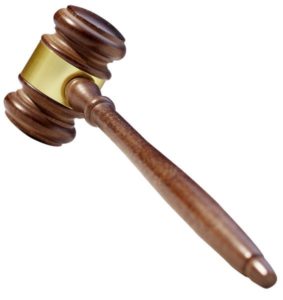
State Act Permits Suit Against Debt Collectors
Sharp Thinking
Thinking
No. 67 Perspectives on Developments in the Law from The Sharp Law Firm, P.C. July 2012
State Act Permits Suit Against Debt Collectors
Violations May Result in Criminal Prosecution, Administrative Action, Private Suits
On its face, the Illinois Collection Agency Act (225 ILCS 425) threatens violators with significant criminal, administrative and other sanctions for violations of the myriad provisions summarized in Sharp Thinking Nos. 65 and 66 (June 2012). Less obvious, but equally real, is the threat of civil lawsuits by the debtors subject to collection activity.
Criminal Provisions. Collection activity without regis-tration is a Class A misdemeanor. § 14. The offense becomes a Class 4 felony on repetition. § 14b. In addition, an agency commits a deceptive collection practice when, with intent to collect a debt, the collector:
(a) represents falsely that he is an attorney, a policeman, a sheriff or deputy sheriff, a bailiff, a county clerk or employee of a county clerk’s office, or any other person who by statute is authorized to enforce the law or any order of a court; or
(b) while attempting to collect an alleged debt, misrepresents to the alleged debtor or to his immediate family the corporate, partnership or proprietary name or other trade or business name under which the debt collector is engaging in debt collections and which he is legally authorized to use; or
(c) while attempting to collect an alleged debt, adds to the debt any service charge, interest or penalty which he is not entitled by law to add; or
(d) threatens to ruin, destroy, or otherwise adversely affect an alleged debtor’s credit rating unless, at the same time, a disclosure is made in accordance with federal law that the alleged debtor has a right to inspect his credit rating; or
(e) accepts from an alleged debtor a payment which he knows is not owed.
Such a deceptive collection practice is punishable by a fine of up to $3,000. 720 ILCS 5/17-5.
In addition, any violation of the act for which no specific penalty is provided is punishable as a 
 Class A misdemeanor on first offense and as a Class 4 felony upon repeat offenses. § 14b.
Class A misdemeanor on first offense and as a Class 4 felony upon repeat offenses. § 14b.
The law generally allows a sentence of 1 to 3 years for a Class 4 felony, and/or a fine. A Class A misdemeanor generally is punishable by a term of less than 1 year, and/or a fine of up to $2,500. 730 ILCS 5/5-4.5-45, 5/5-4.5-50, 5/5-4.5-55, 5/5-4.5-70.
Injunctive Provisions. The director of the Department of Financial & Professional Regulation, the attorney general, the state’s attorneys, and “any person” are authorized to commence an action for injunctive relief against an agency engaging in collection activity without required registration. § 14a. In addition, it appears that the director must proceed for an injunction under § 14a whenever an agency has been convicted as a repeat offender under § 14b’s criminal provisions.
Administrative Action. Under § 9 the Department is given the power to “refuse to issue or renew, or  may revoke, suspend, place on probation, reprimand or take other disciplinary action . . ., including fines not to exceed $5,000 for a first violation and not to exceed $10,000 for a second or subsequent violation,”
may revoke, suspend, place on probation, reprimand or take other disciplinary action . . ., including fines not to exceed $5,000 for a first violation and not to exceed $10,000 for a second or subsequent violation,”  for any violation of the myriad prohibitions in § 9 (see generally Sharp Thinking No. 66 (June 2012). Consumers are permitted to instigate disciplinary proceedings by filing a written complaint with the Department (§ 10). However, this results in a somewhat complex hearing process before a hearing officer and a disciplinary board a majority of the members of which are employed by registrant collection agencies (§§ 9.22, 13.1, 13.3, 19, 22). While the Department is not bound to accept the board’s recommendation, it is obligated to give the board a “written and specific explanation” if it overrules the recommendation (§ 13.3).
for any violation of the myriad prohibitions in § 9 (see generally Sharp Thinking No. 66 (June 2012). Consumers are permitted to instigate disciplinary proceedings by filing a written complaint with the Department (§ 10). However, this results in a somewhat complex hearing process before a hearing officer and a disciplinary board a majority of the members of which are employed by registrant collection agencies (§§ 9.22, 13.1, 13.3, 19, 22). While the Department is not bound to accept the board’s recommendation, it is obligated to give the board a “written and specific explanation” if it overrules the recommendation (§ 13.3).
Private Cause of Action. The reader of only the act’s text would conclude that the only remedies provided for an injured debtor are the right to complain to the Department and the right to seek an injunction. For example, § 9, by its terms, authorizes only the Department to take action for violation of its numerous provisions. This inference is bolstered by § 9.7, which, by its terms, authorizes only the attorney general to enforce indicated violations of the Act under the Consumer Fraud & Deceptive Business Practices Act, 815 ILCS 505.
However, case law holds that the act authorizes a private cause of action. Sherman v. Field Clinic, 74  Ill.App.3d 21 (1979); Grant-Hall v. Cavalry Portfolio Serv., LLC, __ F.Supp.2d __, 2012 WL 619651 (N.D. Ill. 2012). See also Randolph v. Crown Asset Mgmt., LLC, 254 F.R.D. 513 (2008) (approving class-action treatment for private suit). This line of decisions includes cases arising under § 9. See Kim v. Riscuity, Inc., 2006 WL 2192121 (N.D. Ill. 2006); Trull v. GC Serv. L.P., 961 F.Supp. 1199 (N.D. Ill. 1997). It even appears to allow recovery of punitive damages in some cases (see Sherman).
Ill.App.3d 21 (1979); Grant-Hall v. Cavalry Portfolio Serv., LLC, __ F.Supp.2d __, 2012 WL 619651 (N.D. Ill. 2012). See also Randolph v. Crown Asset Mgmt., LLC, 254 F.R.D. 513 (2008) (approving class-action treatment for private suit). This line of decisions includes cases arising under § 9. See Kim v. Riscuity, Inc., 2006 WL 2192121 (N.D. Ill. 2006); Trull v. GC Serv. L.P., 961 F.Supp. 1199 (N.D. Ill. 1997). It even appears to allow recovery of punitive damages in some cases (see Sherman).
However, unlike with the federal Fair Debt Collection Practices Act (see Sharp  Thinking No. 64 (May 2012)), the cases under the state act require that the debtors have sustained actual injury in order to state a claim under the act. McCabe v. Crawford & Co., 272 F.Supp.2d 736 (N.D. Ill. 2003). An impact on one’s credit score is actual injury (Riscuity), as is paying a filing fee to defend against a wrongly-brought lawsuit (Herkert v. MRC Rec. Corp., 655 F.Supp.2d 870 (N.D. Ill. 2009); Grant-Hall). Mere attorney fees are not considered actual damages, however (McCabe; Grant-Hall).
Thinking No. 64 (May 2012)), the cases under the state act require that the debtors have sustained actual injury in order to state a claim under the act. McCabe v. Crawford & Co., 272 F.Supp.2d 736 (N.D. Ill. 2003). An impact on one’s credit score is actual injury (Riscuity), as is paying a filing fee to defend against a wrongly-brought lawsuit (Herkert v. MRC Rec. Corp., 655 F.Supp.2d 870 (N.D. Ill. 2009); Grant-Hall). Mere attorney fees are not considered actual damages, however (McCabe; Grant-Hall).
Statute of Limitations. A 5-year statute of limitations applies for actions against registrants under the act. A continuing violation is assumed to have occurred when it first occurred for these purposes. § 9.5.
John T. Hundley, Jhundley@lotsharp.com, 618-242-0246
THE SHARP LAW FIRM, P.C.
1115 Harrison, P.O. Box 906, Mt. Vernon, IL 62864 • Telephone 618-242-0246 • Facsimile 618-242-1170
Business Transactions • Litigation • Financial Law • Problem Finances • Real Estate • Corporate • Commercial Disputes • Creditors’ Rights •
Arbitration • Employment Matters • Estate Planning • Probate
67
